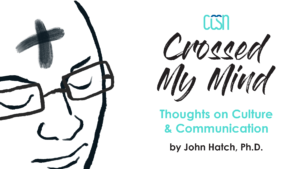 Column title: Crossed My Mind: Thoughts on Culture and Communication
Column title: Crossed My Mind: Thoughts on Culture and Communication
Column entry: Holy Week: Cross-ing the Chasm of (Apparently) Meaningless Suffering
By John Hatch, Ph.D.
Eastern University (retired)
CCSN Senior Fellow
Column Description: As Christians, we are called to have the mind of Christ. This goes against the grain of our social and cultural conditioning. We seek personal or political advancement; Christ seeks the lost and the least. We grasp for cultural ascendency; Christ descends to the cross of love. This column is dedicated to thinking about culture and communication under the sign of the cross.
March 2024 | February 2024(2) / February 2024(1) / January 2024 / December 2023 / November 2023 / October 2023 / July 2023 / June 2023 / May 2023 / April 2023 / March 2023 / February 2023 / January 2023 / December 2022 / November(2) 2022 / November 2022 / October 2022 / August-September 2022 / June-July 2022 / January 2022 / December 2021 / October-November 2021
March 2024
Holy Week: Cross-ing the Chasm of (Apparently) Meaningless Suffering
Writing on the cusp of Holy Week, I’m devoting this month’s column to a brief reflection on the cross of Christ. While sin and atonement are part and parcel of the cross, I’d like to look at it from another angle: how God makes meaning of an oft meaningless world.
The field of communication (in which I’m trained) revolves around the creation and sharing of meaning. Unlike other animals, humans are compulsive meaning-makers, seeking a coherent understanding of the universe and their place in it. The gift of language enables us to name, construe, and reflect on what we experience, putting together understandings of the world that go beyond our means of survival. As individuals, we inhabit not just physical environments, but distinctive worlds of meaning developed in our cultures and relationships over time. For this reason, communication is not just sending a message, but connecting and coordinating worlds of meaning between communicators.
Most religions recognize some ultimate Source and Ground of meaning in the world. Christians, in particular, believe that meaning arises from the Divine, Personal Word of creation, who made humans in God’s image, endowing us with the power of language that undergirds naming, reflecting, questioning, meaning, choice-making, and creating.
We live, however, in a “fallen” world, where human pride, selfishness, deception, oppression, violence, and cruelty—as well as random accidents, diseases, birth defects, and natural disasters—produce unspeakable suffering and challenge life’s meaningfulness. As much as we may strive to overcome and prevent evil, we remain subject to evil’s assault on the meaning of “good”—a good God, a good world, etc.
This is where the crucified Christ meets us. On the cross, the Word-made-flesh confronts not only our sins against God, our neighbor, and our beautiful planet, but also our victimization by other human beings and our abandonment by an apparently indifferent universe. When our best reasoning, clearest communication, and cleverest meaning making fail to make good sense of evil around us, the cross bridges the gap with the mystery of a divine love that suffers with and for us—and ultimately redeems both ourselves and our world.
Having experienced only mild suffering in my lifetime, I am way out of my depth here. However, one writer who has helped me make these connections—inspired by the way of Christ and the life of St. Francis of Assisi—is Richard Rohr. I’d like to share a few of his thoughts that I think merit consideration.
First, one of the unredeemed ways in which humans make meaning of the evil and suffering in our world is through victimhood. Sometimes we look for a scapegoat on whom we can blame our ills and project our sins, and they become our sacrificial victim. By abusing, expelling, or eliminating the person or group whom we deem responsible for evil in our lives, we gain a sense of moral superiority and mastery over our world. Or, if we don’t have the power to do that, we may embrace the idea that we ourselves are victims, finding meaning, identity, and righteousness in victimhood. As Rohr points out, “Playing the victim is an effective way of getting moral high ground without doing any moral development whatsoever . . . we just have to accuse somebody else of being worse than we are, or of being a member of a race or group that is worse than ours.”[i]
The cross, however, exposes the bankruptcy of both approaches. In going to the cross, “Jesus neither played the victim nor created victims. He became a saving and forgiving victim.”[ii] By offering himself willingly, motivated by trust in the Father and love for us, Christ breaks the cycle of victimhood and victimization that makes human life cruel and meaningless. He shows us how to be “a living sacrifice, holy and pleasing to God,”[iii] living from love and not fear, with a willingness to suffer rather than a compulsion to control.
Seen through a wider frame, the cross of Christ also reveals how God identifies with our humanity and makes meaning of our mixed-up world. Rohr sees it as “a statement from God that reality has a cruciform pattern. Jesus was killed in a collision of cross-purposes, conflicting interests, and half-truths, caught between the demands of an empire and the religious establishment of his day. The cross was the price Jesus paid for living in a ‘mixed’ world, which is both human and divine, broken and utterly whole. He hung between a good thief and a bad thief, between heaven and earth, inside of both humanity and divinity . . . In so doing, Jesus demonstrated that Reality is not meaningless and absurd, even if it isn’t always perfectly logical or consistent.”[iv] What’s more, the cross demonstrated that God, out of infinite love, suffers with and for us: “The ‘crucified God’ as personified in Jesus revealed that God is always on the side of suffering wherever it is found.”[v]
Here’s where it gets challenging, though. If we really want to enter into the power of Christ’s cross—God’s redeeming love for the world—we must take up our own cross and follow him. The true Meaning that overcomes the world’s absurdity and sin is not a concept we can simply master intellectually and communicate in words. We must live into it and embody it to those around us. Rohr suggests that this begins with new vision and softened hearts:
“I believe that we are invited to gaze upon the image of the crucified Jesus to soften our hearts toward all suffering, to help us see how we ourselves have been ‘bitten’ by hatred and violence, and to know that God’s heart has always been softened toward us. In turning our gaze to this divine truth—in dropping our many modes of scapegoating and self-justification—we gain compassion toward ourselves and all others who suffer.”[vi]
Rohr adds: “Those who agree to carry and love what God loves—which is both the good and the bad—and to pay the price for its reconciliation within themselves, these are the followers of Jesus Christ.”[vii]
That’s a lot to chew on. In so doing, I pray it helps us connect more deeply with the Crucified Word who is the fountain of all Meaning.
* The views of any CCSN columnists are their own, and do not necessarily represent the views of the CCSN. We invite and embrace a wide range of views and critiques on important communication and cultural issues. The CCSN is a community of Jesus followers who study communication. We do not support or promote a particular social, political, or denominational agenda.
Notes
[i] Richard Rohr, The Wisdom Pattern (Cincinnati: Franciscan Media, 2020), 24.
[ii] Rohr, The Wisdom Pattern, 26.
[iii] Romans 12:1, NIV.
[iv] Richard Rohr, The Universal Christ (New York: Convergent, 2019), 147.
[v] Richard Rohr, Eager to Love: The Alternative Way of Francis of Assisi (Cincinnati, Franciscan Media, 2014), 23.
[vi] Rohr, The Universal Christ, 152.
[vii] Rohr, The Universal Christ, 153.

